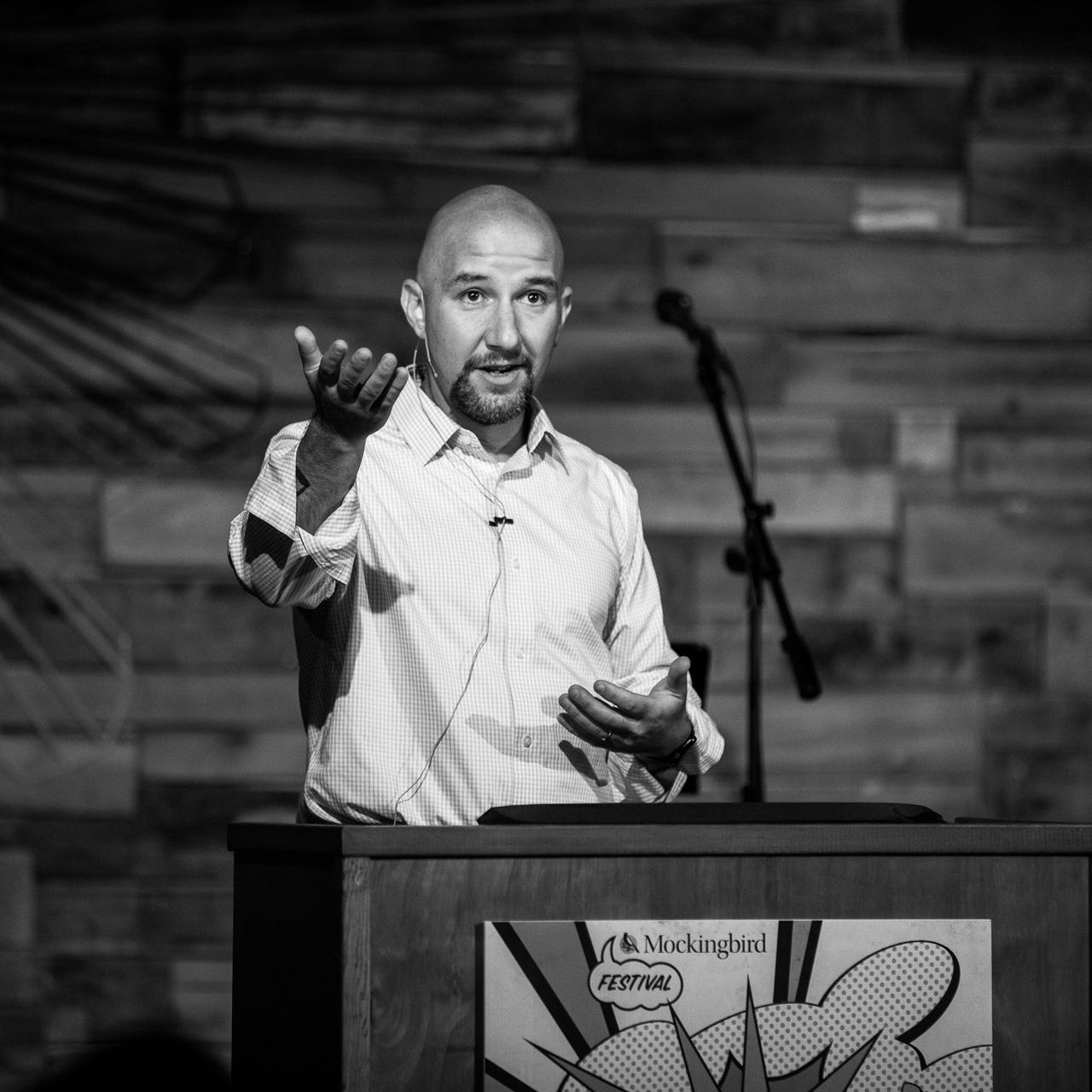Romans 5.12-21
Before he became a celebrated New Testament scholar, Ernst Käsemann was a Lutheran preacher in Nazi Germany. Knowing full well that undercover agents and Gestapo officers sat in his church’s pews, one Sunday in 1937 Käsemann nevertheless dared to preach the day’s scripture passage. He took it straight-up, Isaiah 26, “Lord, our God, other lords indeed rule over us besides you but we invoke only you and your name.” Only a few minutes into his sermon, Nazis pulled the preacher from the pulpit, dragged him down the sanctuary aisle, and threw him into a Gestapo detention facility.
Nevertheless!
Every evening during his imprisonment, Käsemann invited the governor of the prison to enjoy a cigar with him. And every Sunday afternoon, members of Käsemann’s flock— mostly coal miners— gathered outside his prison window to sing with a brass band. Pointing to Paul’s Epistle to the Romans, Käsemann later brushed aside any characterization of his preaching as courageous or his congregation’s witness as valiant. Käsemann had no other choice but to be hospitable to his captor. His congregation had no other recourse before them but to respond to their pastor’s predicament with winsomeness. They had no option but to be so “bold,” Käsemann insisted, given the fact that grace now reigns over all. “Grace reigns now not over some but over all and thus for all,” Käsemann explained.
And then the future biblical scholar supplied his skeptical audience with the chapter and verse, “Romans 5.21.”
“Grace reigns now not over some but over all and thus for all,”
“Where sin abounded, grace abounded more exceedingly; so that, as Sin reigned in Death, even so might grace reign through Christ’s righteousness.”
Weak.
Sinners.
Godless.
Enemies.
The apostle has just deployed disturbing language to describe us, the objects of God’s justifying work. And Paul has done so in the first-person plural, placing both himself and the Roman Christians alike under the burden of such impeaching epithets as, “While we were yet his enemies, Christ died for the ungodly.” To insure his audience understands that they too are included in that we, to foreclose any possibility that readers will exempt themselves from scripture’s indictment, Paul subsequently reaches all the way back to the disobedience of the Old Adam to demonstrate how the twinned powers of Sin and Death catch us all into their rebellious rule.
In a sermon on this text, the New Testament scholar Richard Hays cleverly imagines Romans 5.12-21 as a student paper for a course at Duke Divinity School. Hays jokes:
"If the apostle Paul had turned this passage in to me as a short theological reflection paper, I would have told him, “Get thee to the writing tutor.””
He’s not wrong.
For starters, Paul begins his argument with a sentence fragment:
“Therefore, just as Sin came into the world through one man, and Death through Sin, and thus Death spread throughout the human race, with the result that all sinned—“
Paul sets out with an incomplete sentence before wandering off into several digressions on the law, Sin and Death, the original trespass that opened the door to them, and the grace-gift that is their ultimate and everlasting undoing. In spite of his many detours, the apostle nonetheless repeats himself several times; for example, five times he uses the construction “One man’s trespass led to…” Even the repetition, however, cannot hide the awkwardness of the logical transitions from one digression to the next.
They’re nearly non sequiturs.
Hays muses:
“If the apostle Paul had turned this passage in to me…I would have called up the Duke Writing Center and told them, “This guy Paul has some weighty ideas, but you really need to help him with this essay…It looks like he was trying out different formulations on his computer, and then just turned in his rough draft without going back to edit it. Finally, he could really use some illustrations to help us follow the point he’s trying to make. I hope you can straighten him out so that he can pass my course on Greek Exegesis of Romans.”
We need a story to understand the point Paul is desperate to communicate.
Some years ago, I co-officiated a burial at Arlington National Cemetery. My co-officiant was a megachurch pastor who was famous for his pithy radio spots, “Not a sermon, just a thought.”A fundamentalist member of the immediate family had insisted on the participation of a pastor “from a Bible-believing church.” When parts for the brief liturgy were doled out, this pastor told me, “I’ll just say a few words.”
The deceased man had died much too early and far too slowly of cancer. After I prayed and read from the apostle Peter about the promise of an imperishable inheritance, my co-officiant stepped to the head of the casket and, after acknowledging the deceased man’s bravery and accomplishments in Afghanistan, he informed us that the dearly departed had nonetheless “failed his most important mission.”
I looked up from the hole in the ground to see if I had misheard him.
“Dan’s lost forever to us,” the preacher lamented, “Dan’s lost forever to us and to God because he never accepted Jesus Christ as his personal Lord and savior.”
I could feel my face immediately turn as red as every alternate stripe on the flag that lay draped over Dan’s casket.
Having pronounced the deceased’s demise, the pastor then invited all of us gathered by the grave to “treat this tragedy as God’s way of giving you an opportunity, an opportunity not to die in sin yourselves.”
I almost rebutted him then and there, but I bit my lip instead and set my mouth into a frown.
“Dan’s death is really God’s gift for you,” he announced with a frightening absence of awareness of the cruelty he’d just uttered.
And I wondered whether the horror that was suddenly stricken on the widow’s face was directed at this pastor or at the God of whom he spoke. The sight of the shudder that wrenched her body was like watching Dan die all over again.
Not content to leave us speculating about an abstraction like lostness, the megachurch pastor proceeded to induce our collective reflection and elicit our earnest repentance. He did so by iterating in grisly detail the eternal suffering that was now the deceased man’s just reaping. Apparently, colon cancer along with the grief of a young widow and three small children were not torments sufficient to satisfy this preacher’s righteous God.
Only later did it occur to me that nothing— literally no thing— this pastor had said to us about God and hell’s eternity had been scriptural. It had sounded religious to be sure, but none of it came from the Bible he’d waved in the air with authority. By contrast, the ancient liturgy I had celebrated from the Book of Worship was really nothing more than a pastiche of promises straight out of scripture, beginning with the very last of Christ’s words on the reign of his grace, “I died and behold I am alive forever more, and I hold the keys of hell and death.”
After the benediction had been spoken and the flag tightly folded, after the casket was lowered into the earth and the line of rifles shot into the air, the preacher lingered graveside to take me to task.
“Son,” he said with a patronizing air, “I don’t know what it is you were trying to accomplish. If I hadn’t been here, you would have left all their souls in jeopardy.”
“In jeopardy?!” I exploded like one of the guns that had just cracked in the air, “In jeopardy?! YOU’RE NOT THEIR SAVIOR!”
He smiled, bemused.
“I know that, son. I was only trying to present the gospel to them.”
“How was that the gospel?” I fired back, vaguely aware that I was shouting, “The gospel cannot be given at the end of a gun. You spent more time talking about Dan, whom you did not know, than you spent talking about Christ, whom you should know but gave very little evidence of any acquaintance.”
“I did talk about Christ,” he objected, “Christ is the one who makes it possible to avoid everlasting condemnation.”
“Possible?!” I yelled and, without realizing it, I stole Käsemann’s line, “Grace reigns now not over some but over all and thus for all,” If Jesus only makes salvation a possibility, if God’s gift does does not reign over all without exception, then grace is less powerful than Sin.”
“I think you might need to take another look at your scriptures, son.”
“No, I really don’t need to do so,” I hollered at him, “I’ve read them— have you? When Paul says “all” he means all.”
He stared at me.
I darted my eyes at our unintended audience.
“Not a sermon,” I said, “just a thought.”
Ernst Käsemann preached the sermon for which he was arrested under the charge of treachery mere days after over seven hundred dissident pastors had been sent to concentration camps. Käsemann’s choice of biblical text was itself provocative. The Nazi regime in 1937 had been pressuring the church to throw out not only the Old Testament but also the epistles of Paul. The Aryans objected to the former’s Jewishness while they despised how the latter contradicted their ideology of God’s favor being only for some.
The allness of the apostle’s gospel offended them.
To the Nazis, the offense of the gospel was not merely its Jewishness.
To the Nazis, the offense of the gospel was its all-inclusiveness.
One of the reasons a professor might dispatch Paul to the university Writing Center is that the apostle’s entire argument would still hold if he proceeded straightaway from verse twelve to verse twenty-one, omitting altogether verses thirteen to twenty. God’s power to redeem all exceeds even Sin’s power to lure all— twelve and twenty-one. Grace reigns over all; this is Paul’s entire point. All the verses in between are unnecessary unless what Paul is desperate to communicate is so startling and so seismic he feels no other choice but to keep turning the claim over in his hand like a glittering, uncut gem.
God’s power to redeem all exceeds even Sin’s power to lure all.
Where sin is excessive, grace is super-excessive.
No wonder Paul’s paper is so poorly written!
The good news is literally too good to be true!
Notice what Paul does not toss into his cluttered reflection paper. There is here no language whatsoever of our trust, our faith, or our repentance. We are present in this passage only as the objects of two disparate, world-rending acts. It’s entirely a contrast between one world-encompassing event versus another cosmic work— the one man’s trespass versus the right-making obedience of Christ Jesus.
God’s grace-gift in Jesus Christ is all-encompassing.
This is why in verse seventeen and beyond the apostle never identifies the they in such a way as to eliminate any category of human beings. The they is we— all of us: “…as the trespass of one brought all people to condemnation, so the righteous act of one brought all people to justification, that is, to life.” Of course, through the centuries many readers have assumed that the all in these verses refers exclusively to all who believe. St. Augustine, for instance, argued implausibly that the word “all” in verse eighteen refers not to every human being throughout the whole of time, as Paul clearly believes, but solely to the limited number of those elected for salvation.
Yet as easily as we might assume that salvation applies only to those who believe, notice how such a limitation undermines Paul’s very argument. According to Paul here in Romans 5, Adam’s act makes the whole of humanity prey to the twinned powers of Sin and Death. If Paul then contrasts Adam’s act with that of Christ but restricts the efficacy of Christ’s act to believers only, his argument falls apart, for it implies that Adam’s trespass is more powerful than Christ’s obedience, since Adam influences all people and Christ only some.
As New Testament scholar Beverly Gaventa notes, when Paul uses the word “many” in this passage it necessarily means all.
Moreover, a salvation that extends only to some and not to all is not an account of redemption capable of eliciting the astonished question which immediately follows this passage at the top of chapter six, “Does this mean that we may continue in sin so that grace may abound?” In other words, “Are you saying salvation is so certain in fact, so cosmic in scope, so all-encompassing in reach that we can do whatever we want without fear of undoing what Christ has done?” For Paul, the good news is so good that it can only produce a dumbfounded response like, “Does this mean we can do whatever we want?”
Paul’s argument moves in a direction far more universal than we might dare imagine. Just as Adam’s trespass infects all people, Christ’s obedience implicates the whole of humanity. Even if only some now experience the gift of faith, all are nevertheless already ensnared in Christ’s redemption.
We need a story to understand the point Paul is desperate to communicate.
Dan’s widow showed up my office three weeks after we committed his body to the ground. She knocked shyly on my open door. I tried to hide my surprise and gestured for her to sit down in front of my desk. She thanked me and dabbed her nose with a tissue.
“I wanted to come by and say thank you,” she said.
“Thank me? For what?”
“For that argument you had at Dan’s burial.”
“Oh, right,” I said, blushing at the memory, “I’m sorry I raised my voice at him.”
“Don’t be,” she replied, “If you hadn’t shouted at him, I doubt I would’ve been able to hear you. But I did hear you, and I wanted to say thank you.”
“For what exactly?”
She bit her lip and clutched her purse.
“I guess it’s the Christianity I grew up in,” she said, “But I’ve spent the last twenty years thinking God was mad at me. Then I heard you yell at that preacher that God loves us so much there’s nothing we can do about it.”
“Amen,” I said and smiled.
The apostle Paul is desperate to convey what is necessarily incomprehensible; thus, it’s not surprising this text cries out for the tutelage of the Duke Writing Center. Or, at the very least the passage could stand for a clear, concise thesis statement.
Here’s one:
The Father is not less merciful than the Son enjoins us to be.
Here’s another:
The Last Adam is more powerful than the First.
Because Christians have been trained at a very deep level of their thinking to believe that the idea of an eternal hell is a clear and unambiguous element of the faith, it can come as a surprise to learn that for the first half millennium most Christians believed— based on canon and creed— that in the End all will be joined to God in Christ. Indeed Christian “universalists” were so numerous a majority in the ancient church that St. Augustine referred to them as misericordes, the merciful-hearted. The fourth century church father Basil of Caesarea once observed that, in his time, a large majority of his fellow Christians believed that hell was not everlasting, and that all in the End would attain salvation. Frankly, it is difficult to convince most Christians that the picture of hell with which they were raised is not actually on display in the pages of scripture.
As my teacher, David Bentley Hart writes in his book That All Shall Be Saved:
“It is my conviction, you see, that the misericordes have always been the ones who got the scriptural story right, to the degree that it is true at all…If Christianity taken as a whole is indeed an entirely coherent and credible system of belief, then the universalist understanding of its message is the only one possible. And, quite imprudently, I say that without the least hesitation or qualification…
There is a general sense among most Christians that the notion of an eternal hell is explicitly and unremittingly advanced in the New Testament; and yet, when we go looking for it in the actual pages of the text, it proves remarkably elusive.
The whole idea is, for instance, entirely absent from the Pauline corpus, as even the thinnest shadow of a hint. Nor is it anywhere patently present in any of the other epistolary texts…On the other hand, however, there are a remarkable number of passages in the New Testament, several of them from Paul’s writings, that instead promise a final salvation of all persons and all things, and in the most unqualified terms…
If one can be swayed simply by the brute force of arithmetic, it seems worth noting that, among the apparently most explicit statements on the last things, the universalist statements are by far the more numerous.”
And the first passage he quotes (out of twenty-three citations) is this text from Paul’s Epistle to the Romans, “So, then, just as through one transgression came condemnation for all, so also through one act of righteousness came a rectification of life for all.”
Commenting on this passage, Hart writes much more clearly than Paul:
“The Judge judged in our place is also the resurrection and the life that has always already succeeded and exceeded the time of condemnation. All of heaven and of hell meet in those three days—and so now, no matter how far any soul may venture from God in all the ages, Christ has already gone further out into that far country, has borne all the consequences of anyone’s alienation from God and neighbor, and has eternally opened the way back into the sanctuary of the Presence. In this way, then, the risen Christ truly is himself already the Temple restored, as his words foretold.”
In the last interview before his death in 2017, the theologian Robert Jenson rebutted a popular cliche about Christ’s obedience and hell’s eternity.
The interviewer said to Jenson, “One of my friends likes to say that there is a hell, but you have to fight your way through the love of God to get there.”
And with a mouth made uncooperative by Parkinson’s Disease, Robert Jenson replied:
“Can you do that?
Is the love of God ever finally defeated?
I don’t think so.
Sometimes I have said, “Well, sure, there’s a hell; it’s just that there won’t be anybody in it.””
In other words, preeminent among the misericordes is God himself, Father, Son and Holy Spirit.
Dan’s widow started to rise up out the chair but then sat down again.
I waited.
Finally she said:
“Dan’s cancer— it was all so horribly slow but it all happened so fast too. He was afraid at the end. I don’t know if that means he didn’t have faith. Anyways, I wanted to say thank you for making it plain to me that Dan’s doubts and sins are no match for God’s grace.”
“Not a sermon,” I said, “just a thought.”
And I watched her smile like she’d just remembered how.
In some ways, if I have been faithful to this biblical text, then you would like to say to me too, “Get thee to the Writing Center.”
If such is the case, then hear the good news:
The promise of the gospel is so surpassingly good its assurance can only leave you asking a question, “Are you saying salvation is so certain in fact, so cosmic in scope, so all-encompassing in reach that we can do whatever we want without fear of undoing what Christ has done?”
And the answer to the question is an invitation.
Come to the table.


















Share this post